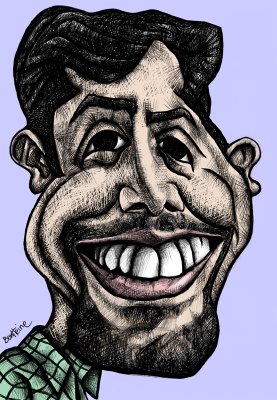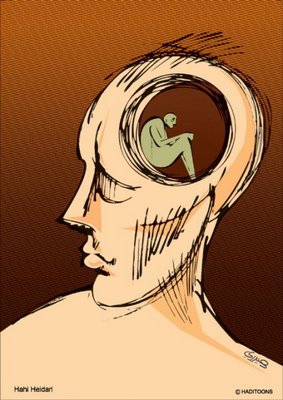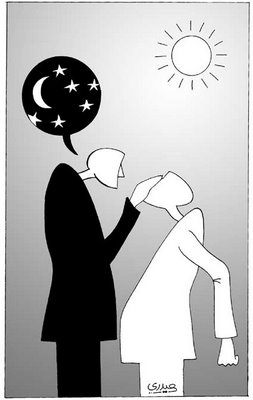Hadi Heidari interviewed by Channel 4

Hadi Heidari was born in 1977 in Tehran. Graduate of painting from Art & Architecture university. He published “Iranian cartoon literature during the reform era”. He is a Member of the International Federation of Journalists and the founder of "haditoons"/"Persiancartoon" website & foundering member of "Persitoons" website.
Collective Interview with Hadi Heidari by channel 4 (England)
(06/11/2006)
JULIAN RUSH: The road to the Iranian nuclear crisis began here 32 years ago, under the shah, with the start of construction of the German-designed Bushehr nuclear power station. We were escorted to the site, but no restrictions were placed on what we could film. It's now 90 percent complete, with a thousand-megawatt Russian reactor inside. Iran insists its nuclear activities are nothing but peaceful. This a standard civil reactor, nothing sinister here, the message.
Even before this plant is complete, Iran is plowing on with ambitious plans for more, almost as if there were no nuclear crisis. A leading politician telling us international tenders for two more reactors at Bushehr will go out within a month.
KAMEL DANESHYAR: From construction of nuclear power plants to the manufacture of nuclear fuel, we invite countries to come into partnership with us, 50-50 with English, European, even American partners. Chinese, Japanese, Indian, we'll work with them.
JULIAN RUSH: Iran's nuclear ambition is fodder for the country's cartoonists. Cartoons are very popular here, the jokes allowing oblique criticism of the regime, allowing boundaries to be pushed. This collective of some of Iran's leading cartoonists set up their Web site three years ago.
I don't think I need an explanation. The big guy is Russian with a knife behind his back.
(LAUGHTER)
The apparently untrustworthy Russians are at Bushehr, their engineers helping the Iranians finish it. Iranian political observers say the government's nuclear policy of demanding the right to enrich uranium is based on a consensus between factions, nuclear power moderates agreeing to support a more hawkish group, as long as they stop at enrichment.
But enrichment is the stumbling block. The latest IAEA report details numerous examples of Iran's continuing reluctance to cooperate. Iran's still refusing, for example, to explain the role of the military and evidence it had acquired documents related to designing a nuclear bomb.
The West suspicious the hawks will go beyond enrichment and their stated position that they don't want nuclear weapons now, just the potential to build them should the need arise.
PROFESSOR NASSER HADIAN: They would argue that we have to develop nuclear weapons capability. I will not make this distinction between the capability and the weapons themselves. So they would argue that, if we have the nuclear weapons capability, that would give us effective deterrence.
JULIAN RUSH: Iran says it wants to build 10 to 15 nuclear power stations, like Bushehr here, over the next 20 to 30 years to meet the soaring energy needs of a growing nation, but it's also a matter of national pride here, too.
"Nuclear power is our inalienable right," is the constant refrain, but this is a country rich in oil and gas; so does Iran really need nuclear power?
Iran may have the second largest reserves of oil in the world, but the oil and gas industry here isn't in good shape, the infrastructure, old, the management, inefficient. Nevertheless, oil and gas exports drive the rapidly growing economy, so perhaps a political and economic argument for nuclear can be made here.
ALI GHEZELBASH: We're looking at an economy that's growing at average rates of about 5 percent a year. Given it's not the double-digit figures we hear about China, but nonetheless it's pretty impressive growth for an economy.
Iran needs to export its oil for hard-currency income. If we're merely to use the oil and gas domestically, I'm sure Iran can survive for another 150 years. But the point is: Are we going to use this for self-sufficiency just to burn up the oil or is it going to be used to strengthen the economy?
HADI HEIDARI: Atomic energy is like a yo-yo that goes up and down. They're playing with it, and they don't always have control of it.
JULIAN RUSH: State TV stations frequently carry programs to encourage support for Iran's nuclear position. When Iranian diplomacy fails to divide its critics, as it did last week in Moscow and Vienna, the message is: Intransigence is denying Iran its rights.
It's all led to huge public support for the government's policy. The programs appeal to national pride and promote modern technology as the way for Iran to gain status in the world with nuclear in the vanguard. Yet, should the recent rhetoric of America's U.N. ambassador, John Bolton, ever be translated into preemptive military action, then the sleepy port of Bushehr may become a target.
UNIDENTIFIED IRANIAN CITIZEN (through translator): They've been deceiving the people. It was supposed to have opened 25 years ago.
UNIDENTIFIED IRANIAN CITIZEN: The majority of Iranian people will support nuclear power because this has become a national goal. All of us will try to achieve this goal.
UNIDENTIFIED IRANIAN CITIZEN: People aren't worried; they'll sacrifice themselves to the last drop of blood.
دوستی هسته ای ایران و روسیه/ کیوان زرگری
دوستی هسته ای ایران و روسیه/ کیوان زرگری
JULIAN RUSH: One of the few to speak out against nuclear here says there's no real debate, little chance for ordinary people to hear that it simply doesn't make economic sense.
AHMED SHIRZAD: Ordinarily, people feel that we will find something very important and we should defend against (inaudible) which they want to prevent us to have it. When they put this pressure on Iranian people, the question of, is it useful or not, is it efficient or not, and some specialistic questions, engineering questions, they disappear.
JULIAN RUSH: It's a great picture of Mohamed ElBaradei, but what do the Iranians see in that?
HADI HEIDARI: This is playing with the face of ElBaradei and the Atomic Energy logo.
JULIAN RUSH: Expectations in the government are high here after all the rhetoric at rallies, but if Iran does eventually compromise with the international community, there may be a domestic political price to pay.
HADI HEIDARI: To me, that's a mistake what government is doing, and they are going to pay a cost. They think that they can manage it in the future.
The government feel that they're going to be able to manage that in the future if they make a deal. But to me, yes, they would try. They would try to explain they want to make a deal, but still they're going to pay a cost.
JULIAN RUSH: Several times we were told further pressure on Iran will shift the balance of power in the nuclear consensus here to the hard-liners; hard to know in the opaque labyrinth that is Iranian politics, but just one more factor for the diplomats meeting in Vienna to take into account.
Cartoons by Hadi Heidari


This interview first appeared on Persian Cartoon
